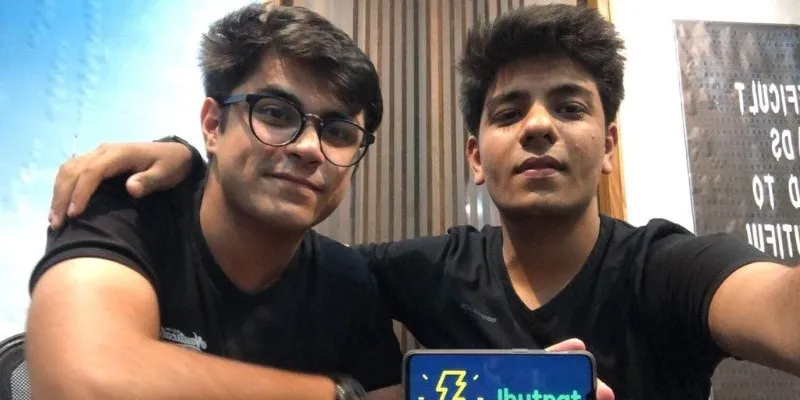Meet the Delhi teenagers who want their hyperlocal delivery startup to be the 'Dunzo for SMBs'
Launched with seed capital of Rs 2 lakh, bootstrapped Jhutpat is focusing on small and medium businesses for now. The Delhi-based hyperlocal delivery startup aims to expand to Mumbai and Bengaluru, and launch an app too.
Most teens are content with securing admission into a good college, but Delhi-based Tanmaay Khurana, 17, and Lakshay Chhabra, 18, wanted more. The duo decided to embrace entrepreneurship while pursuing their degree course. Their hyperlocal delivery startup, Jhutpat, offers instant pickup and delivery across Delhi-NCR for small and medium businesses that need anywhere between five and 100 deliveries a day.
Incidentally, Jhutpat was launched last year as a project for competition by a team of eight school students. Two of the team members – Tanmaay and Lakshay - decided to continue running the startup as a pilot. They launched it officially in January 2019 after raising seed capital of Rs 2 lakh from friends and family.
How Jhutpat started
The startup began life as an idea for the TIE Young Entrepreneurs (TYE) programme last year and won the TYE Regionals at TiE Delhi NCR, followed by the Best Innovation Award at the TYE Globals in the US for its “execution, trials, market research, and teamwork”. Initially, the venture envisaged concierge services for end users, but Tanmaay and Lakshay soon realised that it was a “whole different beast” when they took over.
“The demand is unpredictable when you work on an accidental model. The marketing costs are endless and client acquisition costs go through the roof. It was not possible to sustain without burning a lot of cash,” Lakshay says.
That is when the two co-founders shifted Jhutpat’s focus to small- and mid-sized companies and ecommerce startups to give them the ability to provide instant delivery, which only behemoths like Amazon are able to offer as of now.
Lakshay says their delivery time can be as quick as two hours or within the same day. “With the B2B focus, we can forecast demand, probable pickup locations, and allocate and appoint scouts accordingly,” he adds.

Lakshay Chhabra, and Tanmaay Khurana decided to see Jhutpat through as a startup even after the school project, run by a team of eight students, wrapped up.
ALSO READ

Operations via WhatsApp
Tanmaay says one of Jhutpat’s key differentiators is that they operate completely via WhatsApp right now, adding that this offers convenience to customers, especially those using the startup’s services to replace their existing delivery staff.
“Our surveys showed that these companies did not need their own apps as they didn’t have delivery volumes. So, to fit into their existing infrastructure and processes we went for an app that all of our customers and scouts already have, an app that had no learning curve and allowed for features like live tracking: WhatsApp,” Tanmaay says.
Jhutpat competes with the likes of Dunzo, which has a presence in Mumbai, Bengaluru, Hyderabad, Delhi, Gurugram, Chennai, and Pune. In the past few months, the Bengaluru-based hyperlocal task management startup has raised additional capital of Rs 80 crore ($11.5 million) in funding from different investors, including Google. In March, it also introduced Checkout with Dunzo, a new B2B logistics service for retailers and small business owners.
However, this does not worry Lakshay and Tanmaay.
Lakshay says Jhutpat is not competing with Dunzo as their operating model sets them apart.
“We are not visible on the end consumer side. Companies use our services by white-labelling us as their in-house staff. We only execute ‘instant delivery' orders clients receive through their website and other channels,” he says.
He adds that the category Jhutpat is focusing on is not actually being catered to at present as SMBs need reliable and affordable services that are managed and controlled by a third party.
A large number of homepreneurs and SMBs have sprung up across India over the last few years. These businesses mostly sell via Facebook, Instagram, and WhatsApp, directly to the consumer rather than opting for online marketplaces. The biggest challenge for these entrepreneurs is logistics. The likes of Delhivery and BlueDart may have made shipping easier for larger players, but a viable volume (of orders) is an essential factor for their services. With four to five orders to be shipped on an average day, these sellers are unable to provide this volume, which is where Jhutpat scores.
With the Indian logistics industry expected to touch $215 billion by 2020, according to IBEF data, the scope for logistics-tech is huge.
“The major benefit of using Jhutpat is that our clients are not restricted to a limited number of options available on an app. It's like having a private concierge for your logistical needs,” Lakshay says.

The startup, which has completed 1,800 orders to date, claims to have an overall profit margin of 55 percent.
Eyeing sustainable growth
The company’s revenue model is based on kilometres; they earn a specific (undisclosed) amount from clients per kilometre. The startup, which has completed 1,800 orders to date, claims to have an overall profit margin of 55 percent.
The young entrepreneurs did not disclose revenues details but said they were not in a hurry to be profitable; their idea is to have “sustainable growth”. “We want to scale but not at the cost of burning money. We maintain break-even every month, and we will continue to maintain that as we grow,” Lakshay says.
At the time of the pilot, Jhutpat also catered to small neighbourhood shops and stores, and clocked 60-90 orders per month from 40-50 clients. However, even that was not sustainable.
“We realised we needed a lean customer base, a smaller number of clients that generate more volumes, rather than serving all kind of clients, so we started targeting corporate partnerships,” Lakshay says.
After the shift, the number of orders has stabilised at 15 per day since the last six months.
The duo has shifted to a dedicated office at Netaji Subhash Place in Delhi and has roped in three more people for management and sales. Right now, the startup acquires clients by cold calling and emailing businesses, which seem like the right fit for them.
Jhutpat has seven major partnerships in Delhi currently, including food delivery company Foodcloud and shoe laundry service Shoemen. Jhutpat currently has 25 (delivery) scouts, comprising full and part-time partners.
The road ahead
“This year, we plan to increase our team to 25 people for management and sales; we aim to have 120 people by next year,” Tanmaay says, adding that they will follow an unusual hiring process where they will “not check any academic qualifications, whether the applicant is applying for a scout or to be a CEO”.
After all, the founders’ background shows that you don’t need work experience to start work.
Tanmaay, who is in Class XII, is a second-time entrepreneur. His first startup, Roamigos, started when he was 15 years old, was a platform to connect foreign travellers with local travel enthusiasts. However, the startup shut down after a falling out between the team members. Lakshay is about to start his under-graduate course this year with a major in business.
The bootstrapped startup also wants to roll out the end-consumer version and app for its service. Jhutpat aims expand to other cities like Mumbai and Bengaluru soon, and is eyeing funding of Rs 20 lakh from external investors.
“Even though we are B2B right now, we ultimately aim to build an infrastructure for a private concierge service for end users,” Tanmaay says.
(Edited by Teja Lele Desai)








